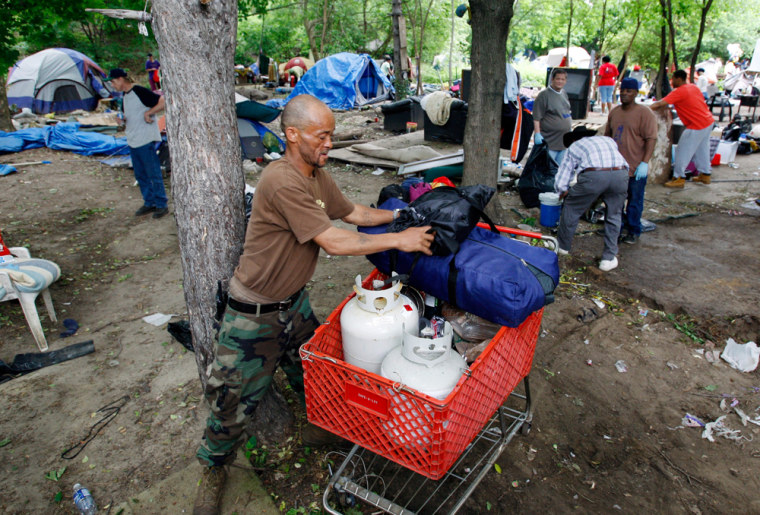A tent city built by the homeless next to a highway exit was disbanded abruptly Thursday as quick-moving and well-off benefactors took some 50 residents off in a bus with a promise of free housing and other services for a year.
The first stop was pampering. The people who lived in the encampment in Camden, one of the nation's poorest cities, were getting a night's stay at an upscale hotel in suburban Mount Laurel. They were getting a dip in a pool, manicures, fresh clothes and a new start.
The last day of Tent City, also known as Transitional Park, came three weeks after a deadline to close the place came and went.
Many of the residents — some had lived there for as long as three years — wanted to live under roofs, but they didn't want to be shoved around by government. The county government and a cadre of social service agencies, meanwhile, could not find them all places to live by the April 15 deadline.
Change came quickly
But then, change came quickly.
It began last week when Amir Khan's son showed him some video shot at the self-governing settlement, hidden on public land between train tracks and a highway exit.
Khan is the son of a doctor who worked for decades in Camden. He's also a wealthy entrepreneur, currently president of NextGen Wireless, pastor of a church in Camden's suburbs, and the founder of The Nehemiah Group, a nonprofit devoted to helping prisoners reintegrate into society.
Khan said he couldn't sleep for days after he saw the conditions in a place so close to home. "We said, 'How dare we live in the lap of luxury and have this in our backyard,'" he said.
While the people who stayed in Tent City were proud of how they built a sense of community, shared their meals and lived by a set of rules they've posted on boards nailed to a tree, the place had troubles. No running water. No bathroom. The fire extinguishers attached to some trees are an inadequate defense against open fires. In summers past, the population has surged to about 100.
On Sunday, members of his Khan's congregation, the Solid Rock Worship Center in Lindenwold, pledged $25,000 to help. The next day, he visited the encampment for the first time. Its founder and acknowledged mayor, Lorenzo "Jamaica" Banks, said his people would leave if they knew they could have free housing for a year.
By Thursday, Khan and his group had worked out the details.
They'd raise at least $250,000. After the night in the hotel, the homeless would move to a Nehemiah Center facility in Bridgeton, where they could stay for 21 days and have their needs assessed. Couples would have to live separately.
After that, they would occupy several rented homes and condominiums in and around Camden.
Some residents skeptical
The social service agencies that assisted them in Tent City would keep helping. So would job training and drug treatment programs.
Even as they knocked down their tents and sorted out their possessions Thursday, residents were skeptical.
In the morning, 31-year-old Jason Strom worried about the next 48 hours.
For Strom, a heroin addict for half his life, and others with drug problems, medical detoxification was to begin Saturday.
With no access to drugs, he was worried that people were going to be sick during the hotel stay.
And as others shuffled onto a tour bus at midday, he and wife, Jessica Kron, still hadn't managed to sift through everything they kept in the tent that has been home for the past year or so.
"If I came to their home and said, 'Pack up and come with me,' how would they feel?" he asked.
Before he got on the bus with his laptop computer, James Boggs, one of the top officials in Tent City's governing structure, seemed amazed that the help he always wanted to line up had arrived. And he wondered whether it was real.
"Where the hell were they before?" he asked. "Is this a backdoor way to get us to leave because they couldn't do it any other way?"
But Hal Miller, a homeless outreach coordinator for Volunteers of America of the Delaware Valley, said all of the residents had agreed to join The Nehemiah Group's rescue effort.
Volunteers assist moving effort
So residents and volunteers spent the morning carting away their possessions in wheelbarrows, shopping carts and wheelchairs.
Tom Lind, a doctor who often brought his family with him to hand out sandwiches and medical equipment for diabetics, took the rules off a tree. They were destined for the walls of his living room in Sewell.
Robins found a fresh source of food as they poked in the flattened mud where tents had sat.
And finally, around 1:30 p.m. Banks hopped in Khan's Cadillac Escalade and stood up with his head through the sun roof.
A few minutes, the busload of Tent City refugees followed.
About that time, another homeless man took an abandoned shopping cart.
He made his away across Federal Street with it and pushed it to the place where he's living — a single tent less than a block from the erstwhile Tent City.
